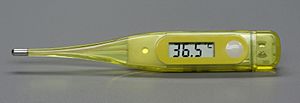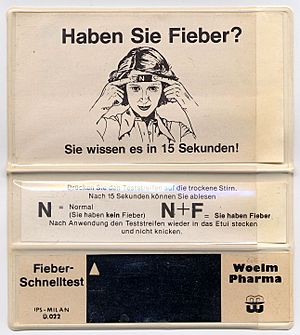Clinical thermometer facts for kids
A clinical thermometer is a special type of thermometer designed to measure the temperature of humans or animals. Many older ones used a liquid metal called mercury. These thermometers were very accurate and sensitive. They had a narrow tube where the mercury would rise quickly with temperature changes.
Doctors and nurses use clinical thermometers in hospitals and clinics. This is why they are sometimes called "doctor's thermometers." Most of these tools show temperature on two scales: the Celsius scale and the Fahrenheit scale. The usual range for these thermometers is from 35 degrees Celsius to 42 degrees Celsius.
Contents
How to Measure Temperature
There are different ways to measure body temperature using a clinical thermometer.
Oral Temperature
To take an oral temperature, the thermometer is placed carefully under the tongue. The person needs to be able to hold it still in their mouth. This method is usually not used for very young children or people who are unconscious. It also might not work well if someone is coughing or vomiting.
Modern digital thermometers work very fast. Older mercury thermometers took several minutes to get a steady reading. If someone has just had a hot or cold drink, it's important to wait a bit. This allows the mouth temperature to return to its normal level before taking a reading.
Armpit Temperature
Measuring temperature in the armpit, also called the axilla, is another method. The thermometer is held tightly under the armpit. You need to hold it there for several minutes to get an accurate measurement.
Ear Temperature
The ear thermometer was invented by Dr. Theodor H. Benzinger in 1964. He wanted to find a way to measure temperature that was very close to the brain's actual temperature. The hypothalamus is a part of the brain that controls our core body temperature. Dr. Benzinger found that the eardrum in the ear canal shares blood vessels with the hypothalamus. This connection allows ear thermometers to give a very good estimate of the body's core temperature.
Types of Clinical Thermometers
Over time, the types of thermometers used have changed.
Mercury Thermometers
For a long time, Mercury-in-glass thermometers were thought to be the most accurate liquid-filled thermometers. However, mercury is a toxic heavy metal. This means it can be harmful if the thermometer breaks. In the 1990s, people decided that mercury thermometers were too risky to use. Because of this, they have mostly been replaced by safer electronic digital thermometers.
Digital Thermometers
Electronic digital thermometers are now very common. They are safe, fast, and easy to read. They use electronic sensors to measure temperature and display it as a number.
Liquid Crystal Thermometers
Another type is the liquid crystal thermometer. These are often found as plastic strips. They contain special heat-sensitive liquid crystals. These crystals change color to show different temperatures. This is a process called thermochromism.
See also
 In Spanish: Termómetro médico para niños
In Spanish: Termómetro médico para niños




